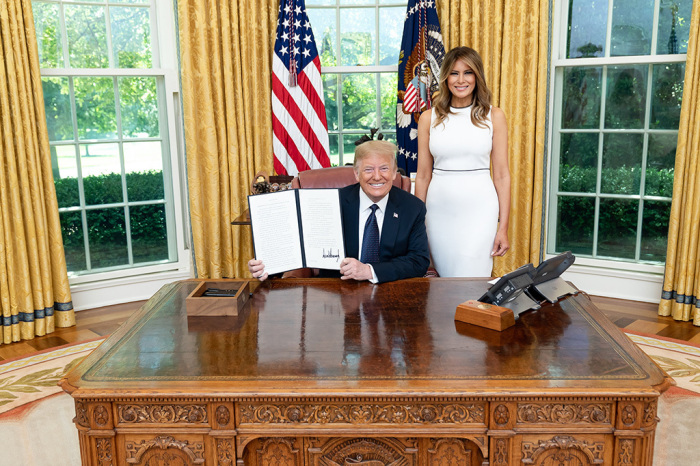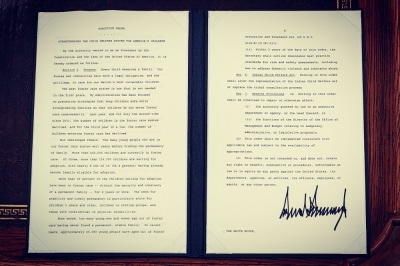Trump signs executive order to strengthen foster care, bolster faith-based partnerships

President Donald Trump signed an executive order seeking to strengthen the nation’s foster care system which calls on states and cities to work with faith-based and other charities at a time when organizations that uphold traditional views of marriage are facing increasing hostility from Democratic lawmakers and left-leaning groups.
Trump’s order signed Wednesday highlights several areas of concern where the president is calling for more research and improvement by federal and state agencies, such as the need to bolster “robust partnerships” between community organizations, improve access to resources for caregivers, and improve federal oversight on welfare requirements.
Although the number of children in foster care in the U.S. has declined in recent years, there are still more than 430,000 children in foster care nationwide and over 124,000 eligible for adoption. The president stressed that “too many” children in the foster care system have to wait years before finding a permanent family.
“In recent years, approximately 20,000 young people have aged out of foster care each year in the United States,” the order states. “Research has shown that young people who age out of the foster care system are likely to experience significant, and significantly increased, life challenges.”
According to the order, 40% of people who age out of foster care experience homelessness and 50% are unemployed by the age of 24. The president called these “unacceptable outcomes.”
“Several factors have contributed to the number of children who wait in foster care for extended periods. First, state and local child welfare agencies often do not have robust partnerships with private community organizations, including faith-based organizations,” the order stressed. “Second, those who step up to be resource families for children in foster care — including kin, guardians, foster parents, and adoptive parents — may lack adequate support.”
A third reason, the order adds, is that the “processes and systems meant to help children and families in crisis have instead created bureaucratic barriers that make it more difficult for these children and families to get the help they need.”

Section 2 of the order calls on the Department of Health and Human Services to encourage “robust partnerships” between state agencies and public, private, as well as faith-based community organizations.
The orders urge the HHS secretary to require states to report on their strategies “for coordinating with nongovernmental organizations, including faith-based and community organizations, to recruit and support foster and adoptive families.”
“Within one year of the date of this order, the secretary shall issue guidance to federal, state, and local agencies on partnering with nongovernmental organizations,” the order explains. “This guidance shall include best practices for information sharing, providing needed services to families to support prevention of children entering foster care, family preservation, foster and adoptive home recruitment and retention, respite care, post-placement family support, and support for older youth.”
The orders call for the secretary’s guidance to “make clear that faith-based organizations are eligible for partnerships under title IV-E of the Act (42 U.S.C. 670 et seq.), on an equal basis, consistent with the First Amendment to the Constitution.”
The order comes as some states and localities in the past decade-plus have ended partnerships with Christian and church-backed foster care agencies because they do not place children in the homes of same-sex couples and refer such parents to other adoption and foster care agencies.
The U.S. Supreme Court will weigh a case brought on behalf of foster care parents who sued the city of Philadelphia last fall.
The case dates back to 2018 when city officials stopped the placement of children with Catholic Social Services of the Archdiocese of Philadelphia because the organization upholds Church teachings on marriage and sexuality and does not place children in the homes of lesbian, gay or transgender couples.
The Trump Justice Department filed a brief to the Supreme Court in favor of protecting the ability of tax-funded faith groups to turn away and refer same-sex couples to other organizations. The Justice Department contends that turning away religious organizations from foster care programs based on their beliefs is religious discrimination.
Although Trump’s new order doesn't specifically touch on whether cities and states should work with groups that uphold policies influenced by traditional teachings on marriage, the Trump administration has in the last three years issued several orders and guidance specifically on religious freedom rights.
In October 2017, then-Attorney General Jeff Sessions issued guidance stating that the Free Exercise Clause of the First Amendment protects businesses, churches and religious organizations no matter if they are affiliated with “any level of government.” The order calls on agencies not to "second-guess the reasonableness of a religious belief."
In addition to foster relationships with charities, Trump’s executive order calls on the HHS to “equip caregivers and those in care to meet their unique challenges.” The order notes that many caregivers lack access to private, faith-based and community services.
The order also calls on the HHS secretary to issue guidance within six months on “the use of federal funds to support and encourage high-quality legal representation for parents and children, including pre-petition representation.” Increased representation would be part of efforts to “prevent the removal of children from their families, safely reunify children and parents, finalize permanency, and ensure that their voices are heard and their rights are protected.”
Among other things, the executive order calls for the publishing of data to aid “in the recruitment of community support” and collect data to “preserve sibling connections.”
In a tweet, HHS Secretary Alex Azar called the executive order part of the administration’s “historic commitment to promoting adoption.”
In a statement, the foster and adoption care organization Bethany Christian Services applauded the executive order, stressing that it “underscores the need for all facets of our nation to work better together for the sake of vulnerable children: governments, states, nonprofit partners, faith communities, and families.”
"Children do best in families, and unfortunately, thousands of kids in America don't have a safe, stable family to grow up in,” the BCS statement reads. “We must improve equitable outcomes within our child welfare system through child and family-centric innovative solutions and a collaborative ‘all hands on deck’ approach. One sector of society can't meet this need on its own; it will take all of us working together.”
Leslie Cooper, the deputy director of the American Civil Liberties Union’s LGBT & HIV Project, called Trump’s executive order a “hypocrisy.”
“While the Trump administration talks about the need for more foster parents, it is making arguments at the Supreme Court and authorizing discrimination in federally funded foster care programs that could result in many prospective parents being turned away by agencies for reasons that have nothing to do with their ability to care for a child,” Cooper said.
Cooper argues that “religion is not a license to discriminate.”
“Agencies providing child welfare services on behalf of the government must put the needs of children first,” she contends. “Turning away prospective foster families because of their sexual orientation, faith, or any other reason unrelated to the ability to support a child limits the families available for children.”
Follow Samuel Smith on Twitter: @IamSamSmith
or Facebook: SamuelSmithCP




























